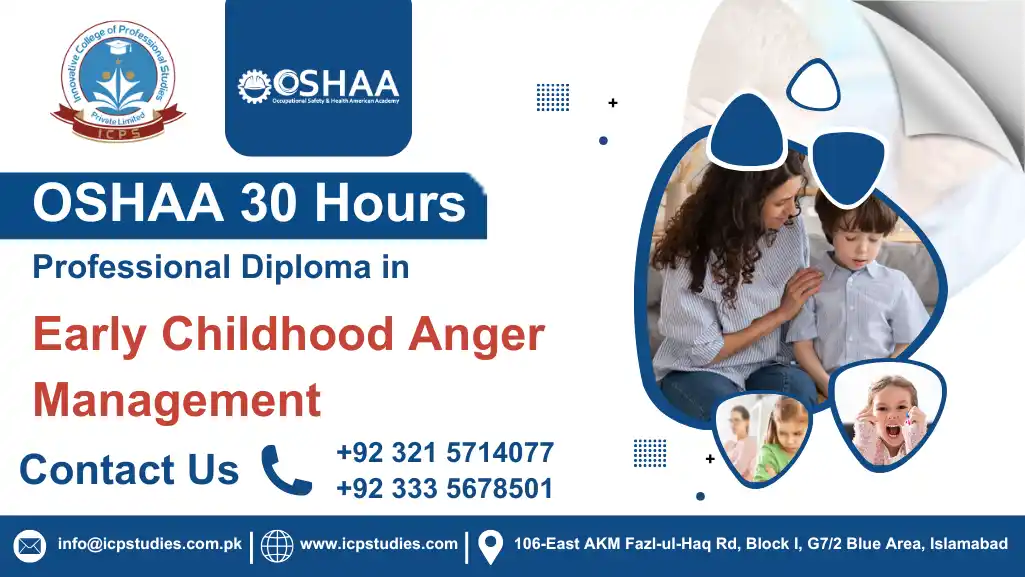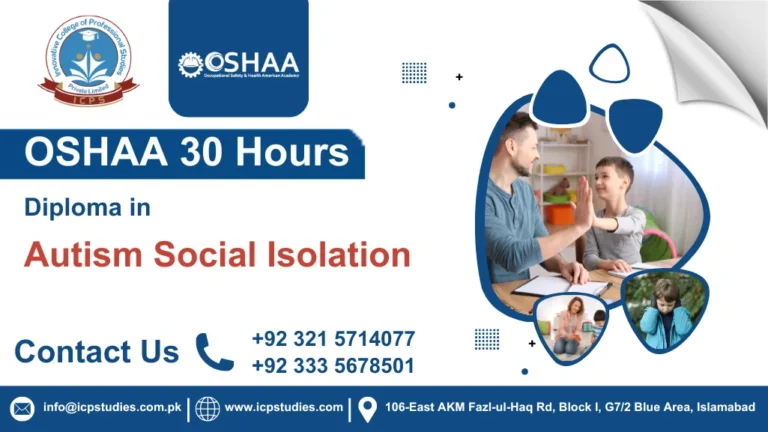Anger in young children can present significant challenges for parents, teachers, and caregivers alike. The OSHAA 30-Hours Professional Diploma in Early Childhood Anger Management is a comprehensive course designed to equip professionals with the skills and knowledge necessary to understand, manage, and address anger-related behaviours in young children. With expert guidance on strategies and techniques, this diploma helps build effective tools for promoting emotional well-being in early childhood settings.
Anger is a natural emotion, but it can be particularly challenging to manage in young children who may not have the developmental maturity to cope with frustration or other strong feelings. When not addressed appropriately, early childhood anger can lead to behavioural issues that affect relationships, learning, and development.
Understanding the triggers and underlying causes of anger in young children is essential for educators and caregivers. By gaining a deeper understanding of emotional regulation, individuals can help children develop healthier coping mechanisms and emotional intelligence. The OSHAA 30-Hours Professional Diploma in Early Childhood Anger Management provides an in-depth approach to this critical area of child development, supporting professionals in fostering positive, emotionally healthy environments for children.
The OSHAA 30-Hours Professional Diploma in Early Childhood Anger Management is an essential qualification for anyone working with young children. With an in-depth focus on the psychological and emotional aspects of anger, this course equips professionals with the tools to manage and support children in developing emotional regulation. By enrolling in this course, you are taking an important step toward fostering emotionally healthy environments that promote the well-being of children in your care.
All About OSHAA 30-Hours Professional Diploma in Early Childhood Anger Management
Course Overview
The OSHAA 30-Hours Professional Diploma in Early Childhood Anger Management is structured to provide participants with a well-rounded understanding of how to manage anger in children between the ages of 3 and 8. Throughout this course, learners will explore a wide range of topics including the psychology of anger in children, the development of emotional regulation, and strategies for creating a supportive, calm learning environment. By the end of the course, participants will be equipped with practical tools to address anger management issues effectively, whether in the classroom, daycare, or at home.
This 30-hour diploma includes a mix of theoretical lessons, case studies, and practical applications. The course is designed for professionals working in early childhood education, child care, and related fields, providing them with the knowledge to handle anger management issues effectively and confidently.
Study Units
- Introduction to Anger in Early Childhood (3 hours)
- Psychological and Biological Causes of Anger in Children (4 hours)
- Recognising the Signs of Anger in Children (3 hours)
- Coping Mechanisms and Emotional Regulation Techniques (4 hours)
- Role of Parents, Caregivers, and Educators in Anger Management (3 hours)
- Developing Emotional Intelligence in Early Childhood (3 hours)
- Conflict Resolution Strategies for Young Children (3 hours)
- Managing Aggressive Behaviour and Tantrums (5 hours)
- Creating Supportive Environments for Emotional Growth (2 hours)
Minimum Age
Participants must be at least 18 years old at the time of enrolment. This ensures that learners have the maturity and capability to engage with the course content and assessments effectively.
Educational Background
While there are no strict academic prerequisites for this course, it is recommended that participants have a basic understanding of early childhood education, child development, or psychology. A background in education, child care, or a related field is advantageous but not mandatory.
Work Experience
Although previous work experience is not a requirement, having practical experience in early childhood education, child care, or social work can enhance your learning experience. The course is designed for individuals working in or aspiring to work in environments where they interact with children, such as schools, nurseries, and daycare centres.
Language Proficiency
Since the course is taught in English, participants should have a functional level of English proficiency. This includes the ability to understand course materials, engage in written assessments, and participate in discussions. If English is not the participant’s first language, they may be required to demonstrate their proficiency through a language test or equivalent.
The OSHAA 30-Hours Professional Diploma in Early Childhood Anger Management is designed for individuals who work with or care for young children and are seeking to understand and manage emotional and behavioural challenges effectively. This course is particularly suitable for:
- Early childhood educators working in nurseries, preschools, and reception classes
- Primary school teachers responsible for managing young learners
- Childcare professionals and nursery assistants involved in daily child supervision
- Teaching assistants supporting children with behavioural needs
- Educational psychologists and behaviour support specialists
- Social workers focusing on child welfare and family support
- Childminders and nannies responsible for home-based childcare
- Parents and guardians interested in understanding and managing their child’s emotional development
- Youth and community workers who engage with children in informal learning environments
This course is ideal for anyone looking to enhance their understanding of childhood anger and contribute positively to a child’s emotional and behavioural well-being.
Learning Outcomes
Introduction to Anger in Early Childhood (3 hours)
- Understand the nature and definition of anger in early childhood
- Explore typical emotional development stages in children
- Identify the importance of early intervention in anger management
Psychological and Biological Causes of Anger in Children (4 hours)
- Analyse key psychological triggers contributing to anger in young children
- Understand the role of neurological and biological factors in emotional responses
- Examine the impact of trauma, stress, and unmet needs on behavioural outbursts
Recognising the Signs of Anger in Children (3 hours)
- Identify common behavioural, verbal, and physical signs of anger
- Distinguish between normal emotional expression and problematic behaviour
- Learn observation techniques for assessing emotional patterns in children
Coping Mechanisms and Emotional Regulation Techniques (4 hours)
- Explore age-appropriate emotional regulation tools for young children
- Implement strategies to help children recognise and manage their emotions
- Apply calming techniques and supportive interventions in real-life scenarios
Role of Parents, Caregivers, and Educators in Anger Management (3 hours)
- Understand the influence of adult modelling and responses on child behaviour
- Develop collaboration strategies between families and educators
- Learn how to provide consistent emotional support across environments
Developing Emotional Intelligence in Early Childhood (3 hours)
- Define emotional intelligence and its importance in early years development
- Introduce tools and activities to promote empathy, self-awareness, and self-control
- Encourage communication and emotional expression through child-centred methods
Conflict Resolution Strategies for Young Children (3 hours)
- Teach basic conflict resolution skills tailored to young learners
- Implement strategies for encouraging problem-solving and cooperative play
- Reduce aggressive responses through proactive communication techniques
Managing Aggressive Behaviour and Tantrums (5 hours)
- Understand the root causes of aggressive outbursts and tantrums
- Apply de-escalation techniques and calming interventions
- Design structured routines and boundaries to support behaviour management
Creating Supportive Environments for Emotional Growth (2 hours)
- Create emotionally safe spaces that promote healthy expression
- Incorporate classroom and home-based strategies to support self-regulation
- Foster inclusive and nurturing environments for all children
FAQs OSHAA 30-Hours Professional Diploma in Early Childhood Anger Management






